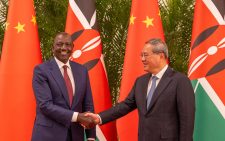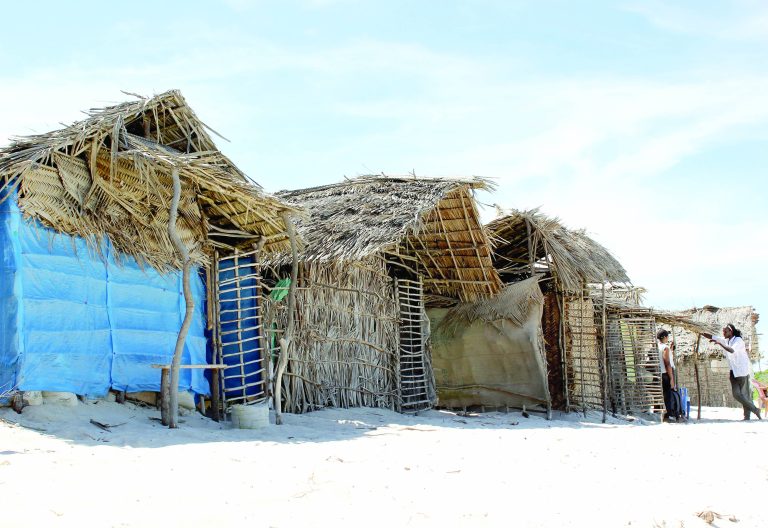Omollo: Kenyans safer than they were last year

Strategic security measures put in place in the past one year, including recruitment of more police officers, improved the security situation in the country, the Ministry of Interior has said, adding that more improvement is expected next year.
“We are very stable security-wise. Kenyans are able to do their businesses largely uninterrupted and we have had success in the initiative of silencing the guns. Look at the cases of cattle rustling which were rampant last year have greatly reduced,” said Internal Security and National Administration PS Raymond Omollo.
In an interview with the media, the PS highlighted at least 10 measures they have, or are planning to, put in place in furtherance of improved peace and security.
To ease the policing burden and enhance security and the fight against crime, the two-year freeze on recruitment has been lifted and additional police officers will be recruited next year.
The National Police Service (NPS) will also recruit cadets. The recruitment of these cadre of officers will be driven more by the recruits’ skills as the service endeavours to match skills to the hiring needs.
“The freeze was mostly because of budget constraints. However, this has been captured in the next financial year’s budget and we will be recruiting police officers to fill in the gaps in the ranks of the police service. We will also be hiring cadets,” PS Omollo said.
As recommended by the Justice (Rtd) David Maraga Taskforce, the PS said the police officers will receive another ten per cent salary increment in 2025. Most junior officers received a 20 per cent salary increase this year.
“We have started with 20 per cent and we will get another 10 per cent in the next financial year, and the remaining 10 per cent in the following financial year,” he said.
To effectively deal with banditry and cattle-rustling, the government has, besides adopting a multi-agency approach, embarked on running education programmes among the youth in affected counties. Equally, to reduce conflicts over resources and pasture, more boreholes will be sunk to provide access to water.
“Most of the boys involved in banditry and cattle rustling are of school-going age but hardly access schools which are either closed or very far from their homes. We want them in school and not out and about with guns,” the PS said.
Village vigilance
The Ministry of Defence is also helping in fast-tracking the rehabilitation of 20 schools that were destroyed by bandits. Already, over ten of the 20 schools have been successfully rehabilitated.
The government has also invested in equipment for security officers on the frontline as well as training of the National Police Reservists (NPRs), besides involving the locals.
“One of our biggest achievements against terrorism is our approach of involving everyone. This greatly improved intelligence gathering and sharing,” the PS said.
To strengthen the grassroots governance and security, the government plans to empower village elders and create the National Government Administration Police Unit (NGAPU), among others.
Already, 106,072 village elders are actively engaged across the country, with the government proposing to give them allowances. The proposed National Government Coordination (Amendment) Bill recommends a phased implementation of a monthly allowance of up to Sh7,000, for village elders across the country.
To ensure that counties contribute meaningfully to national peace and security, the government has developed the Prevention of Violent Extremism (PVE) Model Bill, which is based are on the unique security challenges of each county.
It is a framework that provides counties with the tools to effectively integrate prevention strategies into their governance structures.
The government will also adopt all legal strategies to ensure the country is safe, including the deployment of the Kenya Defence Forces (KDF).
The military deployment has in the past received a lot of criticism but the PS said the soldiers’ experience especially in Somalia over the last 13 years, and their equipment have been a major boost in dealing with terrorists and bandits.
“For as long as the banditry and terrorism persist, the government will do anything to protect them and if this will require military assistance,” he said.
Concerns have also been raised on the force and the humiliating manner in which officers are effecting arrests amid accusations of abductions. The PS said though are generally allowed to use reasonable force when arresting suspects, nothing should justify the use of greater force than is reasonable or necessary.
All persons arrested should be booked in custody in police stations before being arraigned or released, with the PS advising members of the public to report any suspected cases of abductions.
“Should anyone believe that their loved one has been abducted, then the most prudent thing to do is to report the matter to the police who will follow it up,” he said.
Porous borders
The PS said the Independent Policing Oversight Authority (IPOA) and the Internal Affairs Unit (IAU) had the full backing of the government to ensure that the service is accountable
The government has warned that the consumption of heroin and cocaine is on the rise in the country and Ethiopia through Moyale has emerged as the new route for their trafficking to Nairobi, replacing the Coast route.
“We are trying to figure out how best to deal with it. Our Anti-Narcotics Unit (ANU) is doing its best to deal with it,” Omollo said.
According to the PS, Kenya’s porous borders were posing serious challenges in the fight against human and drug trafficking as well as counterfeit goods. The main challenges are the Kenya and Ethiopia, Tanzania Uganda and Somalia borders.









